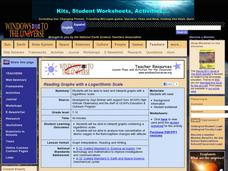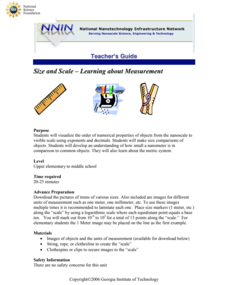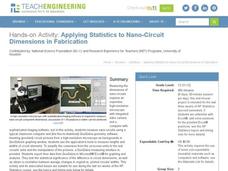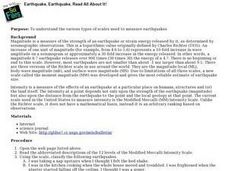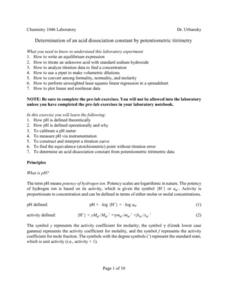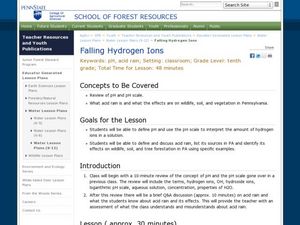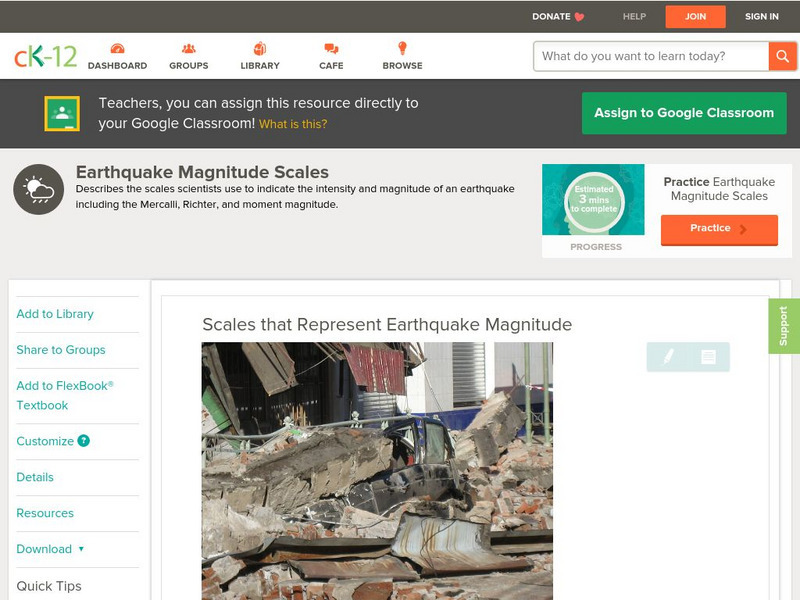Curated OER
Reading Graphs with a Logarithmic Scale
Guide high school meteorologists through a detailed examination of oxygen concentration data. The learners analyze a line graph containing logarithmic data and employ the use of a graphing calculator. A comprehensive worksheet and links...
Learning Games Lab
Logarithm Calculator
Support your young scientists' knowledge of logarithms with a quick video lesson. The instruction first presents the relationship between a base-10 logarithm and an exponential equation. It then demonstrates how to use a calculator to...
Chemistry Collective
Virtual Lab: Determination of the pH Scale by the Method of Successive Dilutions
Where did the pH scale come from? Take a deeper look at a most important measure of ion concentration using a simulated physical determination. Young chemists prepare a series of dilutions after determining a dilution factor for the...
Teach Engineering
Common and Natural Logarithms and Solving Equations
Log some practice with logarithms. A PowerPoint presentation provides a tutorial on the change of base formula involving natural logarithms and solving exponential equations with logarithms in the fourth installment of a seven-part...
National Nanotechnology Infrastructure Network
Size and Scale – Learning about Measurement
Can you visualize one billionth of a meter? It's not easy to understand the scale of a nanometer. Learners use a hands-on lesson to develop an understanding of the size of a nanometer in comparison to common objects. They walk away with...
University of Colorado
Spacecraft Speed
Space shuttles traveled around Earth at a speed of 17,500 miles per hour, way faster than trains, planes, or automobiles travel! In the 13th installment of 22, groups graph different speeds to show how quickly spacecraft move through...
Curated OER
Magnitude of the Richter Scale
Learners examine how a Richter scale operates. They create a booklet illustrating each rating on the scale. They discover how engineers use different measurement tools.
Curated OER
Sense of Scale
Students examine the pH scale. They research common products and determine their pH level. They create their own pH scale and place their products in the appropriate place.
Teach Engineering
Statistical Analysis of Flexible Circuits
Scholars connect statistical analysis with flexible electric circuits. They first learn about flexible circuits and their applications through a PowerPoint presentation and then consider how the fabrication process for these circuits...
Teach Engineering
Applying Statistics to Nano-Circuit Dimensions in Fabrication
Do flexible circuits change dimensions during fabrication? Groups use GeoGebra software to measure the length of pictures of flexible nano-circuits. To determine if the circuits change dimensions, future engineers use Microsoft...
Chymist
Visualizing pH
Why are acids and bases important in our daily lives? Lead the class in answering this question, among others, as they experiment with pH paper and classify where various substances belong on the pH scale. They also taste common acids...
Curated OER
What's a Tree Worth?
Students calculate the board footage of a tree. For this forestry lesson, students use a Biltmore tree scale stick to calculate the number of board feet that would be produced. They quantify the economic value of a tree from this...
Curated OER
Earthquake, Earthquake, Read All About It!
Students utilize the U.S. Geological Service web site. They research the various types of scales used to measure earthquakes and classify different situations on the scale. They write a story about a town that has just experienced a quake.
Biology Junction
Chemistry
You matter—unless you multiply yourself by the speed of light squared, then you energy! Scholars learn about matter, energy, the elements and so much more using an informative presentation. Completing the included worksheet creates a...
Curated OER
Catch a Wave. . .
Part of a larger online space science website, this page has a brief explanation of electromagnetic radiation and a chart of wavelengths as compared to common objects. There are four questions to answer about the information. This can be...
Curated OER
Calculating pH
In this pH learning exercise, students are given information and directions as to how to calculate the pH of solutions. They use their calculators to find the pH of given solutions and apply what they learned about identifying acids and...
Curated OER
Determination of An Acid Dissociation
In this chemistry worksheet, students examine the given concept in order to apply in the laboratory setting. The sheet includes in depth background information.
Carnegie Mellon University
Ocean Acidification
After brainstorming what they know about ocean acidification, youngsters place eggs in acid to determine the effects on calcium-containing organisms, and add carbon dioxide to solutions with sea shell material to discover the impact on...
Curated OER
pH and Red Cabbage Juice
Middle schoolers review properties of materials and define what pH tells them about matter. In this pH levels lesson plan, students determine whether materials are acids or bases using indicator substances.
Curated OER
Acid Rain
Students understand the dynamics of acid rain and its impact on the living and non-living environment. They hypothesize how acid rain affects water pH levels in two lake systems with differing watershed features.
Curated OER
How Many Quasars Are There?
For this quasars worksheet, students read about how astronomers can detect quasars by their luminosity. Students use a given equation to solve 4 problems including finding quasar magnitude, determining the number of quasars with given...
Curated OER
Falling Hydrogen Ions
Tenth graders define pH and use it to interpret amounts of hydrogen ions in a solution. In this hydrogen lesson plan students read about acid rain, divide into groups and present their information to the class.
Curated OER
Earth Science: In Depth Look at Earthquakes
Learners engage in an interactive Internet lesson covering the reasons and results of earthquakes. After reading eyewitness accounts and viewing animations, they use seismograms to measure and locate the epicenters. In an ongoing study,...
CK-12 Foundation
Ck 12: Earth Science: Scales That Represent Earthquake Magnitude
[Free Registration/Login may be required to access all resource tools.] Covers the scales scientists use to measure the size and intensity of earthquakes.
